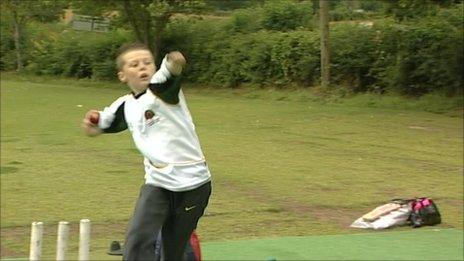Disability cricket: Meet the Warwickshire team given a cricketing chance
- Published
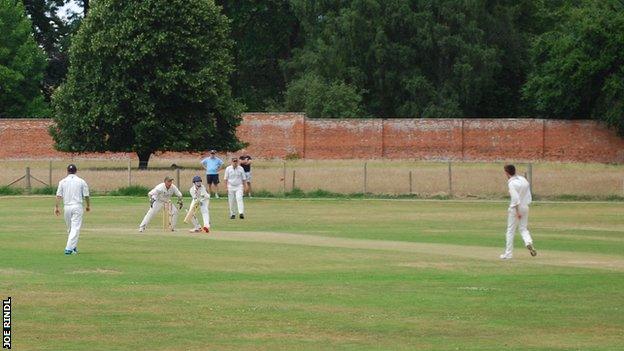
Warwickshire play their home games at Alcester and Ragley Cricket Club and train at Edgbaston
An all-rounder with no forearms, a batsman who rarely leaves his home and the youngster who has had his life transformed by cricket. BBC Kick Off reporter Josef Rindl met the Warwickshire disability cricket team preparing to take on England.
"What you gonna do when you get into bat, Joe?"
"Boot it," shouts 18-year-old Joe Glaze, as a broad smile stretches across his face before what is just his third match for Warwickshire Super9's disability cricket team.
After facing Derbyshire, his next could be against England's physical disability team at home in the Midlands on Sunday, 30 July.
Glaze was only introduced to the game three months earlier, having attended a cricket festival at his special needs school. He suffers from a rare genetic disorder and is also on the autistic spectrum.
Joe's father, Andy, has quickly got involved as an assistant coach and is an avid photographer from the sidelines.
"Sport teaches you life skills," Andy told BBC Sport. "It teaches you teamwork, discipline, but most importantly social skills. It is all ideal for someone like Joe."
Glaze runs towards his father and screams excitedly: "10, 10, Dad I'm batting at 10."
"Three months ago he couldn't hold a bat," Andy recalled. "Now he's the only batsman I've seen who runs from the clubhouse to the crease."
Recounting the first time his son picked up the bat, Andy continued: "We were in a school sports hall and he hit the ball down the length of the hall and through an open corridor - it remains one of my happiest moments in cricket.
"I just had to get involved. For the kids here, (the Super9's) is brilliant."
'The hidden game'
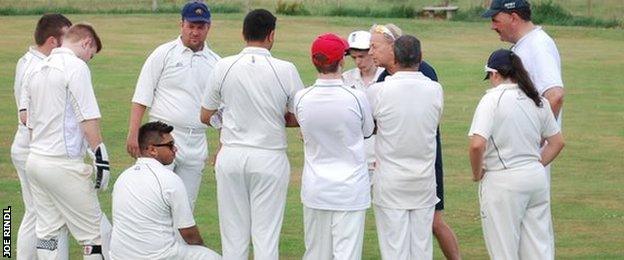
Warwickshire last won the Super9's championships in 2005
For some, the match against Derbyshire represented their last chance to impress ahead of England's visit, with two players in the squad on the fringes of national selection.
Charlie Pestridge, the captain, is one of them. He is a batsman, a bowler and against Derbyshire, because nobody else is available, a stand-in wicketkeeper.
Pestridge, who has cerebral palsy, said it took him about six months to even find a disability team.
"It's that hidden," he said. "I'm glad I discovered the team. It's great to be able to see people play who wouldn't usually have been given a chance."
Super9's cricket explained |
|---|
The format is exclusive to players with either, or both, physical and learning disabilities. |
A softer, plastic 'Incrediball' is used, rather than traditional leather balls. |
It can be played by teams of nine, 10 or 11 players, as agreed between the captains. |
The match, played at the picturesque Alcester and Ragley Cricket Club, has all the hallmarks of the traditional village cricket game; cars parked around the boundary, spectators construct a gazebo and small children hide under the mobile covers.
Pestridge, 20, is now on the cusp of the national team, regularly attending a training centre in Northampton.
He hopes to earn England selection for next year's tri-series tournament against Australia and South Africa.
To do so, Pestridge has to juggle a busy schedule. He studies mathematics at Bath University and featuring for Warwickshire in their Midlands Group game against Derbyshire means an 180-mile round trip.
"Right now I'm not sure whether to prioritise the degree or aim towards representing my country," he admitted.
"I'd love to play for England."
Facing England
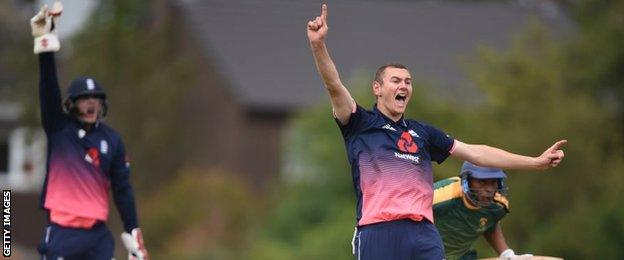
The England Learning Disability team won eight and had one no result in their nine fixtures in the 2017 tri-series
There are three England disability sides, representing the visually impaired, learning and physical disabilities.
Both the learning and physical disability teams play tri-series against Australia and South Africa in alternate years, with the learning disability side winning the latest series in July., external
Without international fixtures this summer, England's physical disability team is touring on home soil, playing eight different teams including three academy sides and a select Army XI.
July is their busiest month, with four tour dates culminating with two T20 fixtures against Warwickshire.
"It will be fantastic," said coach Andy Wyles, who led Warwickshire Super9's to their maiden Championship title in 2005. "How many of this team a year ago would have thought they'd play against England?"
'I had nowhere else to go'
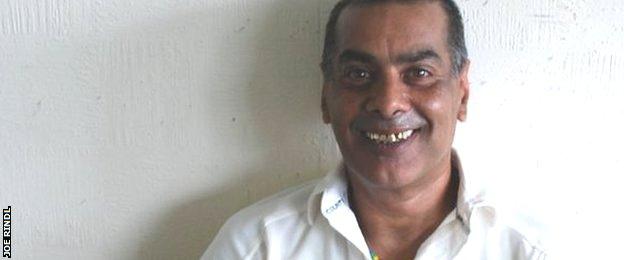
Tarac Sarwar gets severe anxiety in crowded spaces, seriously hampering his ability to do everyday tasks
There is a constant buzz of chit-chat among the Warwickshire players, so much so that one player, Tarac Sarwar, was given two warnings by the umpire for talking during the bowlers' run-up.
He also got so carried away whilst batting at the non-striker's end that he appealed against his own team-mate.
His nickname is "chatterbox", and at the age of 48 he is a transformed man.
Sarwar is among the oldest in the team and the only time he left his house in the three weeks leading up to the match was to train.
"At my home I'm in my own world," he says. "I spend most of my time watching cartoons, never the news. That just reminds me of my own problems."
Sarwar has autism, dyslexia, has regular panic attacks and sometimes epileptic fits.
He continued: "In my day people did not understand dyslexia. They would rather say 'I wasn't learning anything because I was a troublemaker', not because I didn't know how to read or write.
"The way they teach now is so much better."
Sarwar rarely left his home until after his 18th birthday. When he did go outdoors, he would go only to the local chip shop and sit there for two hours.
"I didn't have any friends; I had nowhere else to go," he said.
But cricket has had a profound effect on Sarwar, opening up new opportunities for social interaction and even employment.
"I don't know where I'd be without the team," said Sarwar, who works at a special school in Birmingham and is a disability cricket coach at his local club.
"I only want to help people, and working at a disability school is so rewarding."
A disability cricket celebrity?
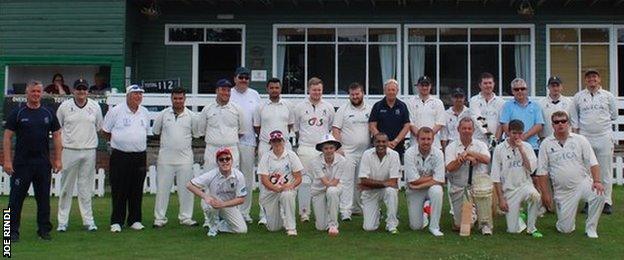
Both Warwickshire and Derbyshire line up for a photo after the match
Warwickshire is a team in which all the players are striving to achieve something unique to them.
For some, it is about learning how to play that sweet straight drive or expanding their personal horizons, while for others it is a stepping stone to international stage.
Kearan Gibbs, 17, has been called up to play for the England Physical Disability Lions, essentially the under-21s.
Born without forearms, Gibbs bowls off-spin without any artificial aids by gripping the ball in the fold of his arms.
He first shot to prominence and become one of "the faces of English disability cricket" when, in 2011, practice facilities were installed in his garden by a charity.
News reports of the gesture went global.
Despite his youth, Gibbs is now one of the most experienced players in the side, having turned out for Warwickshire and Northants as well as making the Super9's final with Somerset in 2012.
Their match against England will be another chance for Gibbs to impress national selectors at a senior level.
"It will be competitive but I'm not too bothered. I just want to help the guys," he said.
And that is what the team represents - a chance.
"A big part of this is giving opportunities that wouldn't have been there in mainstream cricket or sport in general," coach Wyles added.
- Published18 October 2019

- Published26 August 2016
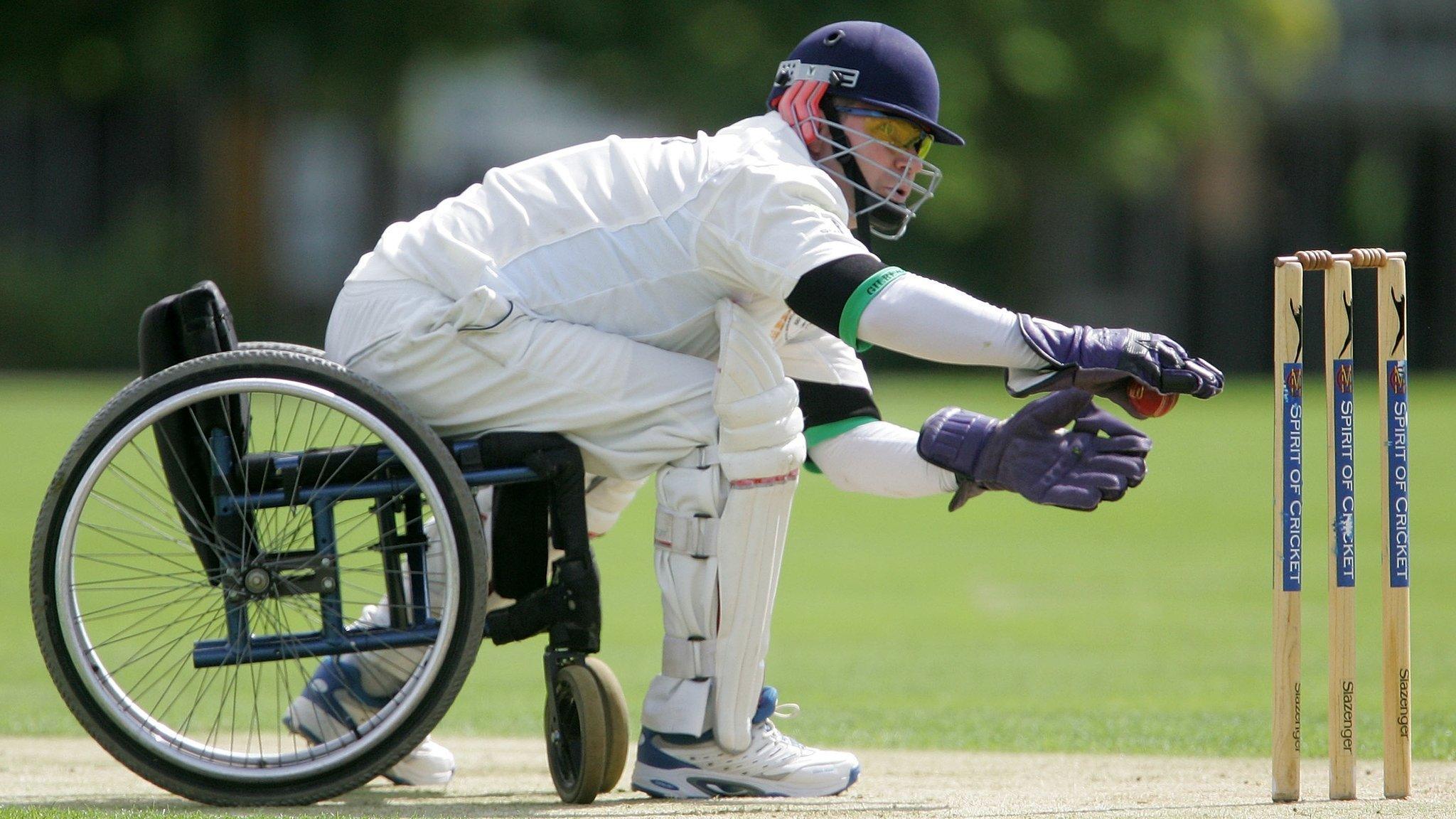
- Published18 March 2015
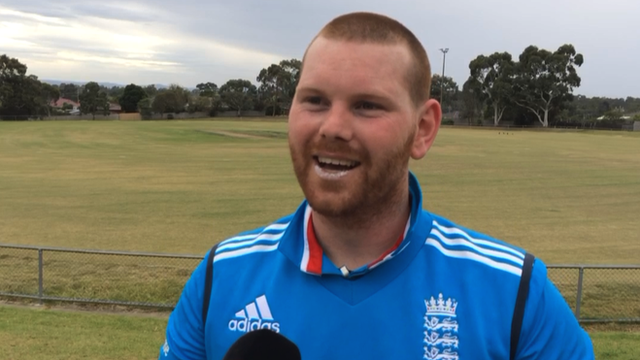
- Attribution
- Published21 July 2011
